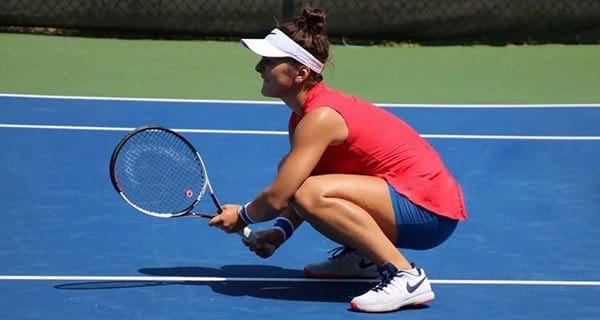 Bianca Andreescu learned many valuable lessons in winning the title at the Canadian Women’s Tennis Association championship last weekend in Toronto.
Bianca Andreescu learned many valuable lessons in winning the title at the Canadian Women’s Tennis Association championship last weekend in Toronto.
She leaned that she has more than enough game to win at the top level. She learned that her conditioning will be a vital piece of her success. She learned that the Canadian media and fans will go crazy for her. And she learned she can drive opponents crazy with her high-maintenance dramas in between shots.
She also learned that no one upstages Serena Williams – even when the Diva of the Baseline loses to you by withdrawing with an injury.
Andreescu only has to cast her mind back to last year’s U.S. Open final where a Serena storm completely overshadowed Naomi Osaka’s win.
After losing her first set at the 2018 Open, Williams was assessed a penalty point for getting coaching from her coach in the stands (a tennis no-no that beggars explanation). This commenced a Serena tirade against chair umpire Carlos Ramos.
When Ramos assessed her another penalty point for breaking her racket in a fit of pique, the tirade went ballistic. Williams demanded an apology from Ramos for saying she cheated. She accused the chair (and tennis in general) of bias against women. When Williams called Ramos a thief for stealing points from her, he assessed her a game penalty, putting her one game from elimination.
With Williams in tears, U.S. Open officials tried to mend fences. To no avail. A distraught Williams lost to newcomer Osaka. During the winner’s ceremony, the crowd rained boos down on the whole fiasco. Williams begged them to give Osaka, also in tears, her moment of glory. As if.
Later, Williams’ coach admitted he was coaching. “Everyone does it,” he explained.
But Williams – who’s the only thing worth watching in women’s tennis on many days – stuck to her no-coaching stance. She then pivoted to the bias against women in tennis and appealed for equity.
While Ramos choosing a Grand Slam final to make a point about the absurd coaching rules of tennis was probably ill-advised, Williams was the architect of her demise. She has a well-documented history of abusing officials and her threats to Ramos were naked intimidation.
But her put-upon message was predictably embraced by the social justice warrior crowd. The insecurity of women in tennis has a real genesis (see the Billie Jean King movie Battle of the Sexes). They’ve often been made to feel that they’re an add-on to the more prestigious men’s tour. While much has changed, the gods of tennis have often misplayed this insecurity.
But extrapolating Williams’ temper tantrum into a cause celebre for all women was another groaner for many. A woman worth hundreds millions of dollars going ballistic on an official being relayed to the world on TV? Please.
Still, Williams was celebrated. Her choleric moment was portrayed by some as a triumph for equal pay for equal work. And that’s kind of funny because women winners get the same prize money playing best-of-three sets as the men who must endure best-of-five sets. You won’t see that in a Nike ad.
But just as she has mastered the top level of women’s tennis at just 19 years old, Bianca is also a quick learner on the Serena file. With tears streaming down Williams’ face as she sat in her chair with a back injury that caused her to withdraw from the Rogers Cup final, Bianca took control and bolted over to Serena’s side to commiserate.
Claiming she has always been Serena’s biggest fan, Bianca hunched down right in front of Williams to have her moment of schadenfreude.
“Oh God, this sucks,” she told Williams, who briefly seemed a might taken aback at Bianca’s effrontery. “I’ve watched you for your whole career … you’re a … beast.”
Bianca then – as if they’ve been friends forever – turned the conversation to her own injury issues in her so-far young career. And to reveal she knew about the tattoos on William’s back.
She then hugged it out with Williams, commiserating that the great lady would soon be in fighting trim again. With that she took her deserved curtain calls.
Serena quickly composed herself at the post-game press conference, describing Andreescu as “an old soul.”
Having seen Cinderella meet the queen, perhaps the only regrettable outcome is that the 37-year-old Williams will only play for a little while longer. A Serena-Bianca rivalry would be a thing to treasure.
Troy Media columnist Bruce Dowbiggin career includes successful stints in television, radio and print. A two-time winner of the Gemini Award as Canada’s top television sports broadcaster, he is also the publisher of Not The Public Broadcaster.
The views, opinions and positions expressed by columnists and contributors are the author’s alone. They do not inherently or expressly reflect the views, opinions and/or positions of our publication.

